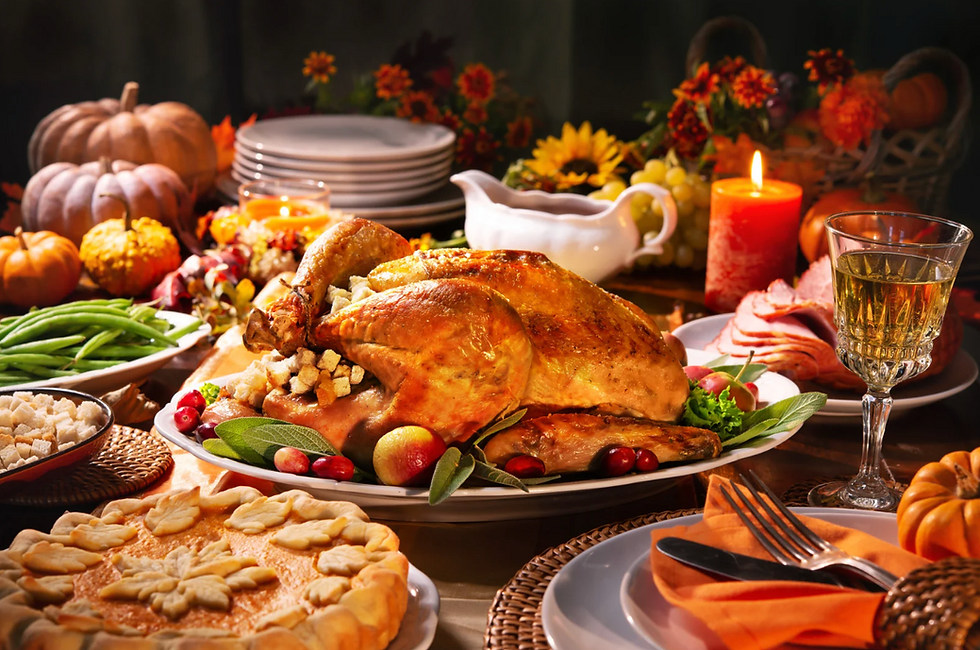Healthy Eating During the Holidays: Tips to Stay on Track
- olivehealthfrontde
- Nov 25, 2024
- 4 min read
The holiday season is often a time of indulgence, with delicious foods, decadent treats, and festive meals making it difficult to stay on track with healthy eating habits. But maintaining a balance between enjoying the holidays and nourishing your body is possible with some mindful choices. Here are some tips to help you eat healthily during the holidays without feeling deprived or missing out on all the fun.

1. Plan Ahead for Social Events
Holidays often mean multiple parties, gatherings, and meals with friends and family. To avoid overindulging, plan ahead:
Eat a healthy snack before heading out to a party or holiday meal. A small snack with protein (like a handful of nuts or a piece of fruit with cheese) can help curb your hunger and prevent overeating.
Offer to bring a healthy dish to gatherings. This way, you’ll have a nutritious option available if other choices are heavy or rich in calories.
Set boundaries: It’s okay to say no or to limit how much you eat. If you're attending multiple events, try not to overeat at every single one.
2. Fill Half Your Plate with Vegetables
Vegetables are rich in fiber, vitamins, and minerals while being low in calories. At any holiday meal, try to make half your plate veggies. This will help you feel full while keeping your calorie intake in check. Opt for roasted vegetables, salads with a light dressing, or steamed greens.
3. Choose Lean Proteins
Turkey, chicken, and fish are great options that can be included in holiday meals. These lean proteins are satisfying and lower in fat than many other traditional holiday proteins like prime rib or ham. If you’re serving yourself at a buffet-style meal, try to fill half your plate with vegetables and a generous portion of lean protein.
4. Be Mindful of Portion Sizes
Holiday meals can often lead to overeating simply because the food looks so appealing. To avoid overdoing it:
Use a smaller plate to help with portion control.
Serve yourself a reasonable portion and savor each bite. It’s easy to lose track of how much we’ve eaten when we’re distracted by conversation or entertainment.
If you feel full but are tempted to go back for seconds, take a moment to pause and check in with your hunger levels. Often, it’s the enjoyment of the social experience rather than the food that we crave.
5. Enjoy Sweets in Moderation
It’s hard to resist holiday desserts—cookies, cakes, and pies are everywhere! Rather than completely depriving yourself, allow for small indulgences:
Savor the flavors: Take the time to really enjoy a small piece of your favorite holiday treat.
Make healthier swaps: Consider baking lower-sugar versions of your favorite desserts or swapping ingredients for healthier alternatives, like using mashed bananas instead of sugar in baked goods or reducing the amount of butter.
Balance out your indulgences: If you know you’re having dessert, balance it with a lighter meal earlier in the day that includes plenty of vegetables and protein.
6. Drink Water First
Holiday drinks like eggnog, sugary cocktails, and soda can add up quickly in terms of calories and sugar. Try to stay hydrated by drinking water throughout the day and before meals. This can help you feel fuller and prevent overeating. When you do choose a festive drink, consider enjoying a small serving and alternating with water.
7. Stay Active
While it’s easy to get caught up in the hustle and bustle of the season, try to make time for physical activity. Even if it’s just a brisk walk after dinner, staying active can help manage weight, improve digestion, and reduce stress.
Take a family walk after holiday meals.
Join a seasonal activity, like ice skating or a holiday fun run, to make movement part of the celebrations.
Dance to holiday music—it’s a fun way to stay active without feeling like you're working out.
8. Practice Mindful Eating
Mindful eating means paying attention to your food and the experience of eating. Instead of rushing through meals or snacking absentmindedly, slow down and enjoy each bite. This can help you feel more satisfied with smaller portions and prevent overeating.
Eat without distractions, like watching TV or scrolling through your phone.
Listen to your body: Check in with yourself to see if you're still hungry or if you're eating out of boredom or habit.
9. Don’t Skip Meals
Skipping meals can lead to overeating later in the day. Try to maintain your regular eating routine, and don't skip meals to "save up" for the big holiday feast. If you’re hungry when the celebration starts, you're more likely to overeat or make less healthy choices. Instead, stick to balanced meals with lean protein, healthy fats, and fiber-rich carbs to keep you satisfied.
10. Enjoy the Moment
Finally, remember that the holidays are about more than just food. Enjoy the company of friends and family, savor the flavors of special meals, and don’t stress over every single bite. A healthy approach to eating doesn’t mean perfection—it means balance and mindfulness. If you overindulge once in a while, don’t be hard on yourself. Get back on track the next meal, and keep moving forward.
Final Thoughts
Healthy eating during the holidays is about finding a balance between enjoyment and nourishment. By making mindful choices, staying active, and not depriving yourself of the pleasures of the season, you can have a healthy and happy holiday. So go ahead and enjoy your favorite holiday foods—just remember to listen to your body, eat in moderation, and savor the moments that matter most.
Happy holidays and healthy eating!




Comments